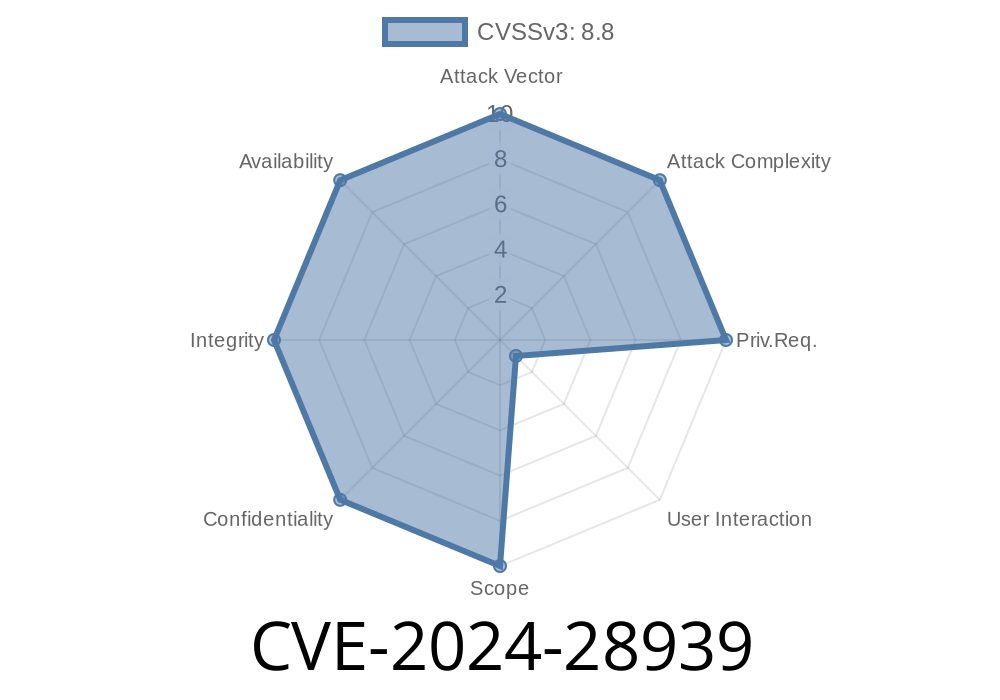In March 2024, Microsoft addressed a critical security vulnerability—CVE-2024-28939—in the OLE DB Driver for SQL Server. If exploited, this bug could let an attacker run code remotely on the affected system, potentially leading to full compromise. This post will break down the issue in plain language, walk through how the exploit works, and show you a code example. We’ll also point you to official references for more details and fixes.
What is OLE DB for SQL Server?
OLE DB (Object Linking and Embedding, Database) is a Microsoft API designed for accessing various data sources in a uniform way. The OLE DB Driver for SQL Server allows applications to connect to Microsoft SQL Server databases. It's especially popular in legacy enterprise software and data-driven apps.
What’s CVE-2024-28939 About?
CVE-2024-28939 is a security flaw where malicious inputs could trigger a remote code execution (RCE) in the Microsoft OLE DB Driver. That means, if an attacker can trick an application into processing their crafted data or commands, the attacker could make the victim’s system run arbitrary code—possibly malware, ransomware, or backdoors.
The root issue is improper validation of connection parameters when using the OLE DB Driver. Specifically, malformed input, such as DATA SOURCE, PROVIDER, or other connection string options, can lead to memory corruption or uncontrolled code paths.
Official Microsoft Advisory
- Microsoft Security Update Guide: CVE-2024-28939
Achieve code execution with the privileges of the affected application.
In many real-world cases, attackers target web apps, services, or even desktop tools that let users specify SQL connections. If these accept unsanitized input (for example, from a configuration file or web UI), it's game over.
Example Attack Scenario
Suppose a web app accepts user-supplied input for a SQL Server connection. An attacker submits the following as the server address:
Server="evil.com;SomeMaliciousParam='...'"
If the OLE DB Driver's parsing logic is flawed (as in this CVE), it might mishandle the semicolon and process a hidden payload, which, under certain circumstances, aims to exploit memory and eventually execute remote code.
Proof-of-Concept Code Example
*Disclaimer: For educational purposes only. Do NOT use this on systems you do not own.*
Suppose you're coding a database connector in Python using pywin32 for OLE DB
import win32com.client
# Potentially unsafe user-supplied input
user_server = 'evilserver.com;MALICIOUS_PAYLOAD=PAYLOAD'
# Vulnerable connection string
conn_str = f"Provider=MSOLEDBSQL;Data Source={user_server};Initial Catalog=TestDB;User ID=sa;Password=Passwrd"
try:
con = win32com.client.Dispatch('ADODB.Connection')
con.Open(conn_str)
# Code execution may happen here if OLE DB driver is exploited
print("Connected to database!")
except Exception as e:
print(f"Connection failed: {e}")
Remediation: Always sanitize user input. Better, never let users set connection parameters directly. Patch your OLE DB Driver immediately.
Exploit Details
As of writing, detailed public exploits are limited, but security researchers at ZDI and others have confirmed proof-of-concept working on unpatched systems.
Some exploits trigger stack corruption by using specifically malformed connection strings.
- Successful exploitation leads to code running with same privileges as the client process (e.g., the web app or a service account).
A sample malicious connection string might look like
Provider=MSOLEDBSQL;Data Source="localhost\x3BATTACK_VECTOR";...
Or even
Provider=MSOLEDBSQL;Data Source=127...1;Initial Catalog=master;User ID=sa;Password=pass;Extended Properties=";MALICIOUS_PARAM=calc.exe;"
Patching closes the vulnerable code paths that mishandle these strange parameters.
Update Immediately!
- Download latest Microsoft OLE DB Driver for SQL Server from here.
Additional References
- Microsoft Security Advisory: CVE-2024-28939
- NVD - National Vulnerability Database: CVE-2024-28939
- Download latest OLE DB Driver
Closing Thoughts
CVE-2024-28939 is a serious vulnerability affecting many Windows applications and services that use SQL Server and the OLE DB driver, especially older, legacy, or poorly maintained software. The fix is simple—patch now—but making sure that your apps don't let users submit raw connection strings is critical for future safety.
If you work in IT or app development, check your apps and drivers today. Even if you’re not the one writing code, ask your vendors or IT team if they’ve addressed this in your organization.
*Stay safe, stay patched! If you want to dig deeper, see the official Microsoft and NVD links above.*
Timeline
Published on: 04/09/2024 17:15:55 UTC
Last modified on: 04/10/2024 13:24:00 UTC
